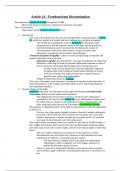Summary
Summary Human Rights Law - Article 14 (Freedom from Discrimination)
- Course
- Institution
Comprehensive summary/essay plan on the Article 14 ECHR right to freedom from discrimination. This document sets out the development of Article 14 through the ECtHR (looking at the parasitic nature of the right, the grounds of discrimination, the definition of discrimination itself, and the develop...
[Show more]



